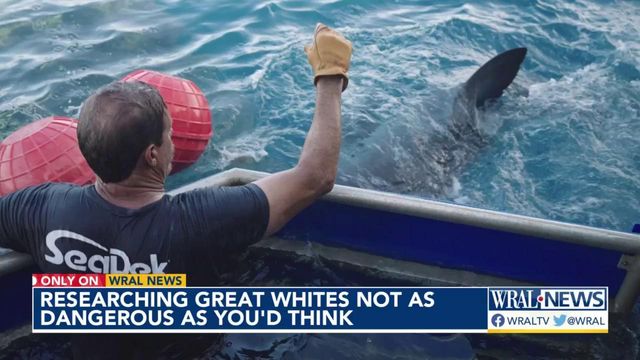Great white sharks tracked near Outer Banks, Myrtle Beach ahead of Memorial Day weekend
Several great white sharks were recorded off the North and South Carolina coasts ahead of Memorial Day weekend.
Crystal, a 460-pound, 10-foot great white, pinged near the Outer Banks on Monday at 10:25 a.m.
Anne Bonny, a 425-pound great white, last pinged off the North Carolina coast near the Outer Banks' Ocracoke Island on May 18 around 11 p.m.
She's 9 feet and 3 inches long and was first tagged in April.
Penny and Ocracoke are two other great whites that recently pinged near Ocracoke Island on May 15.
Breton, a 1,437-pound great white, pinged off of the South Carolina coast near Myrtle Beach on Monday around 7:30 p.m.
He's 13 feet and 3 inches long and was first tagged in September 2020.
Freya, another great white, last pinged outside of South Carolina near Myrtle Beach on Saturday at 11 a.m. She weighs in at a whopping 883 pounds and is 11 feet and 8 inches long.
How do researchers catch and track sharks?
An expedition by great white shark research group Ocearch recently wrapped up off of the North Carolina coast.
The group has studied hundreds of sharks around the world and equipped them with global positioning tags so scientists and the public can track the sharks’ movement.
Expedition leader Chris Fischer says there’s a different type of thrill when bringing in the large predators compared to the excitement you see from big game fishermen.
"When we capture these animals it’s not like catching a fish, it’s more like teaching a dog how to heel," Fischer told about the process.
Of course, the big difference is these animals average about 15 feet in length, can weigh up to 2,500 pounds and have dozens of razor-sharp teeth. Fischer understands the fear and fascination but says sharks mean so much more to our daily lives.
"I think the biggest misconception about sharks in general is people are afraid of them and they’re primary role is to actually guard our fish stocks so there’s stuff for us to eat," he says.
The scientists catch, then lead the big sharks into a cradle. The process includes people getting into the water to make sure the shark is positioned right.
"I call it the white shark slide," Fischer said. "It comes up out of the water, a hose goes in its mouth so it can breathe, a towel goes over its eyes, this kind of makes it go real mellow."
Fischer points to a biological condition that makes the sharks easier to handle than you’d expect.
"They have this condition called learned helplessness which means for the most part they just lay there until it’s over and swim away," he explained.
Fischer says it's a phenomenon that many new human parents have experienced.
"If they know they can’t give away, they give up. It’s the same kind of condition that a baby has when you swaddle it and it finally gives up and stops crying," he says.
From ultrasounds to blood samples to installing tracking devices, the team moves quickly when the sharks are out of the water.
"We'll go through about 24 research projects that are completed in 15 minutes," said Fischer.
Then comes the real thrill, Fischer says.
"You see the animal swim away and everyone has 10 fingers and 10 toes, you get kind of ... and you know you’ve done good," Fischer said. "You have this euphoric relief."














